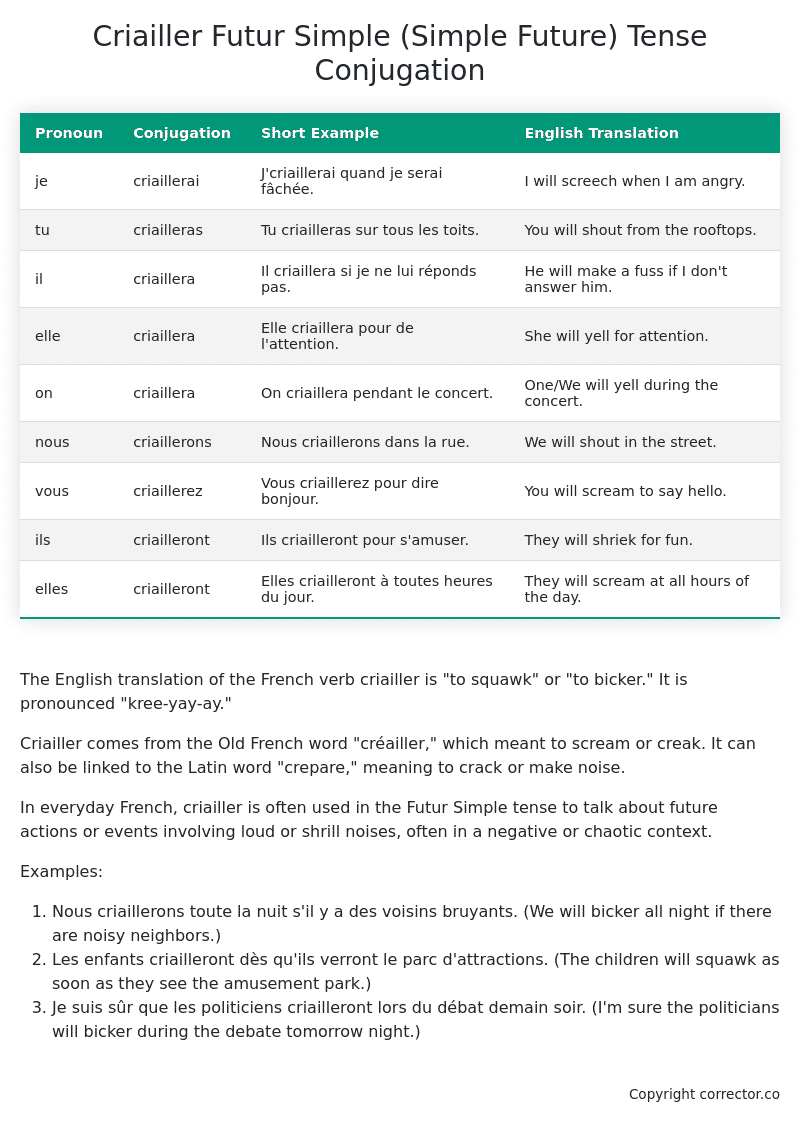Futur Simple (Simple Future) Tense Conjugation of the French Verb criailler
Introduction to the verb criailler
The English translation of the French verb criailler is “to squawk” or “to bicker.” It is pronounced “kree-yay-ay.”
Criailler comes from the Old French word “créailler,” which meant to scream or creak. It can also be linked to the Latin word “crepare,” meaning to crack or make noise.
In everyday French, criailler is often used in the Futur Simple tense to talk about future actions or events involving loud or shrill noises, often in a negative or chaotic context.
Examples:
- Nous criaillerons toute la nuit s’il y a des voisins bruyants. (We will bicker all night if there are noisy neighbors.)
- Les enfants criailleront dès qu’ils verront le parc d’attractions. (The children will squawk as soon as they see the amusement park.)
- Je suis sûr que les politiciens criailleront lors du débat demain soir. (I’m sure the politicians will bicker during the debate tomorrow night.)
Table of the Futur Simple (Simple Future) Tense Conjugation of criailler
| Pronoun | Conjugation | Short Example | English Translation |
|---|---|---|---|
| je | criaillerai | J’criaillerai quand je serai fâchée. | I will screech when I am angry. |
| tu | criailleras | Tu criailleras sur tous les toits. | You will shout from the rooftops. |
| il | criaillera | Il criaillera si je ne lui réponds pas. | He will make a fuss if I don’t answer him. |
| elle | criaillera | Elle criaillera pour de l’attention. | She will yell for attention. |
| on | criaillera | On criaillera pendant le concert. | One/We will yell during the concert. |
| nous | criaillerons | Nous criaillerons dans la rue. | We will shout in the street. |
| vous | criaillerez | Vous criaillerez pour dire bonjour. | You will scream to say hello. |
| ils | criailleront | Ils criailleront pour s’amuser. | They will shriek for fun. |
| elles | criailleront | Elles criailleront à toutes heures du jour. | They will scream at all hours of the day. |
Other Conjugations for Criailler.
Le Present (Present Tense) Conjugation of the French Verb criailler
Imparfait (Imperfect) Tense Conjugation of the French Verb criailler
Passé Simple (Simple Past) Tense Conjugation of the French Verb criailler
Passé Composé (Present Perfect) Tense Conjugation of the French Verb criailler
Futur Simple (Simple Future) Tense Conjugation of the French Verb criailler (this article)
Futur Proche (Near Future) Tense Conjugation of the French Verb criailler
Plus-que-parfait (Pluperfect) Tense Conjugation of the French Verb criailler
Passé Antérieur (Past Anterior) Tense Conjugation of the French Verb criailler
Futur Antérieur (Future Anterior) Tense Conjugation of the French Verb criailler
Subjonctif Présent (Subjunctive Present) Tense Conjugation of the French Verb criailler
Subjonctif Passé (Subjunctive Past) Tense Conjugation of the French Verb criailler
Subjonctif Imparfait (Subjunctive Imperfect) Tense Conjugation of the French Verb criailler
Subjonctif Plus-que-parfait (Subjunctive Pluperfect) Tense Conjugation of the French Verb criailler
Conditionnel Présent (Conditional Present) Tense Conjugation of the French Verb criailler
Conditionnel Passé (Conditional Past) Tense Conjugation of the French Verb criailler
L’impératif Présent (Imperative Present) Tense Conjugation of the French Verb criailler
L’infinitif Présent (Infinitive Present) Tense Conjugation of the French Verb criailler
Struggling with French verbs or the language in general? Why not use our free French Grammar Checker – no registration required!
Get a FREE Download Study Sheet of this Conjugation 🔥
Simply right click the image below, click “save image” and get your free reference for the criailler Futur Simple tense conjugation!

Criailler – About the French Futur Simple (Simple Future) Tense
Formation of Futur Simple
For regular -er verbs (e.g., parler – to speak)
For regular -ir verbs (e.g., finir – to finish)
For regular -re verbs (e.g., vendre – to sell)
Common Everyday Usage Patterns
Conditional Statements
Interactions with Other Tenses
Futur Antérieur
Conditional
Present
Summary
I hope you enjoyed this article on the verb criailler. Still in a learning mood? Check out another TOTALLY random French verb conjugation!


